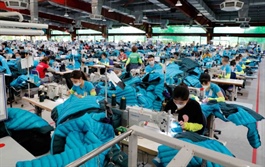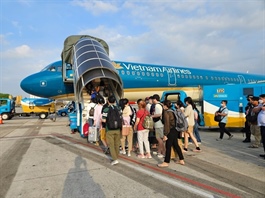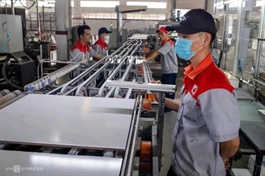Semiconductor industry in Vietnam can now go global
Semiconductor industry in Vietnam can now go global
Vietnam’s semiconductor and electronics sector is gaining momentum, fuelled by rising global demand and government support. Do Thi Thuy Huong, an executive board member of the Vietnam Electronic Industries Association, spoke with VIR’s Hoang Oanh about key strategies to develop a globally competitive ecosystem.
The semiconductor industry has been identified by the government as one of the pillars of economic development. What factors are contributing to the strong attraction of investment in this sector?
|
Do Thi Thuy Huong, an executive board member of the Vietnam Electronic Industries Association |
Vietnam’s electronics and semiconductor industry is entering a phase of significant development, driven by three key factors: rising global demand, robust government support, and competitive advantages in resources and geographical location.
This is a crucial sector for Vietnam, especially in terms of exports. According to the Vietnam Customs, the export value of the electronics sector reached $126.9 billion in 2024, accounting for one-third of Vietnam’s total export turnover.
By the end of 2025, the semiconductor industry’s revenue is projected to reach $21 billion, representing an 18 per cent increase compared to the previous year, with an annual compound growth rate of over 10 per cent. By 2030, it is forecasted that the sector’s revenue could come in at $31 billion.
Vietnam is emerging as an attractive destination in the semiconductor supply chain, chosen by many global corporations such as Intel, Samsung, Qualcomm, and Amkor due to its competitive labour costs, stable socio-political environment, and extensive free trade agreements.
One of the decisive factors in attracting major corporations like TSMC, Nvidia, and Qualcomm is the presence of internationally standardised technical infrastructure. Qualcomm launched a research and development centre in Vietnam in early June, signalling positive developments from investors.
What advantages and challenges do Vietnamese electronics and semiconductor companies face in becoming the region’s centre for semiconductor manufacturing and design?
Vietnam’s electronics and semiconductor industry is poised for a great opportunity in 2025 to become the centre for semiconductor manufacturing and design in the region, based on strategic policy frameworks, attracting international investment and domestic capacity in infrastructure, personnel, and technology.
Vietnam possesses the second-largest rare earth reserves in the world, accounting for 18 per cent of global reserves, which is a key factor in chip production. Each year, about 14,000 engineering students related to the semiconductor field graduate, but this number is still insufficient to meet actual demand, with forecasts indicating a need for around 50,000 semiconductor engineers by 2030.
Simultaneously, the Vietnamese semiconductor industry is actively applying advanced technological such as AI, 5G networks, nanotechnology, graphene, and new generation silicon. AI is being used in chip design, predictive maintenance, and market analysis, while companies are also implementing green technology and environmental management to aim for sustainable production.
The government aims to make Vietnam a global semiconductor hub by 2030, focusing on attracting foreign direct investment and developing high-quality human resources. However, current realities show that Vietnam lacks internationally standard chip manufacturing plants and primarily operates in packaging and testing, such as at Intel’s facilities in Ho Chi Minh City or Amkor in the northern province of Bac Ninh.
The production infrastructure still lacks core elements such as manufacturing plants, cleanrooms, deep research laboratories, and quality assessment systems. Meanwhile, most companies currently serve foreign-led projects, and domestic enterprises still face challenges in participating in the global supply chain.
What proposals has your association made to promote the development of infrastructure for the semiconductor industry?
We have put forward specific proposals. These include investing in the expansion of high-tech zones in Ho Chi Minh City, Hanoi, and Danang with cleanroom facilities, certification centres, and stable power systems, and encouraging public-private partnership models to build small-scale chip manufacturing plants for research and specialised production.
According to research from the Vietnam Electronics Industry Association, internationally standardised infrastructure is a prerequisite for helping domestic companies participate in high value-added stages such as integrated circuit design, which represents up to 53 per cent of the value of a chip. At the same time, this is also a critical factor in attracting large corporations.
We have collaborated with groups such as the Semiconductor Industry Association to encourage tech transfer and build laboratories, providing financial and technical support for smaller enterprises to invest in infrastructure such as cleanrooms, as well as establishing national standard systems and internationally certified testing centres.
- 11:50 10/07/2025



























